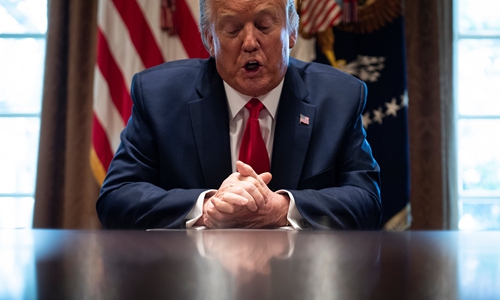HOME >> OPINION
Trump’s promise not to use ‘Chinese virus’ unlikely to stop US’ ethnic slander
Source:Global Times Published: 2020/3/25 19:23:40

US President Donald Trump makes a statement for the press after a meeting with nursing industry representatives in the Roosevelt Room of the White House about the COVID-19 pandemic on Wednesday in Washington, DC. Photo: AFP
A few days after US President Donald Trump first dropped his verbal bomb by using the term "Chinese virus" to refer to the novel coronavirus, he said on Tuesday that he would stop associating the virus with China.While he said he did not regret using the term, some US politicians are not likely to stop smearing China.
Republican Senator Marco Rubio last week said China's behavior amid the COVID-19 outbreak "must be addressed" as the country "denied the world valuable information." Then on Monday, he and two other senators sent a letter to Trump requesting the formation of a task force under the National Security Council to counter the so-called propaganda from the Communist Party of China, the country's ruling party.
These politicians lack basic knowledge of the COVID-19 pandemic but still dare propose absurd policies. China has sacrificed and achieved in containing the coronavirus, which they deliberately ignore so they continue to live in their imaginary world.
When US officials and politicians slandered China with racist terms, it's called freedom of speech. But when some Chinese diplomats launch counterattacks on Twitter, US political elites call on the social networks to shut down their accounts. In their view, whatever China says is malicious propaganda and a vicious attack against the US, and even US errors were made because China set the US up. If the US does not strengthen its COVID-19 prevention and control measures, the epidemic will spread even wider and force US conservative politicians to realize that both the virus and epidemic know no borders, and cooperating with China is the most effective way for them to tackle the outbreak.
Many US scholars, scientists, and mainstream media outlets have criticized the Trump administration for its racist terms targeting China during the pandemic, and have appealed to Washington to learn lessons from China and cooperate with Beijing.
Paranoid remarks and policies won't help the US government relieve the pressure it is facing and will further damage US-China ties. This helps neither the epidemic prevention in the US nor Trump's reelection.
Trump declared a national emergency but has been unable to prevent the historical fall in stock markets, overshadowing his reelection chances. This is why many worried Republican politicians will likely continue to accuse China of imaginary misdeeds.
Their attacks on China won't change the fact that the coronavirus is spreading across the US and that the federal government is not dealing with it appropriately. Having felt increasing pressure, partly because of the growing number of violent cases against Asian Americans in the US, Trump tweeted on Monday that the US must "totally protect" the Asian American community in the country. A day later, he said he won't use the racist term "Chinese virus" that threw an entire ethnic group into the abyss of racist and xenophobic attacks.
Trump is rectifying what was obviously wrong in the hope of getting votes from Asian Americans, most of whom voted against him in the 2016 elections. His slight atonement is mere political expediency.
So will the US stop compromising relations with China after its president changed his racist tone? It's hard to say. Attacking China is being used as a lifesaver to buoy Trump during a storm of anxiety over his administration's inability to effectively deal with the coronavirus epidemic. The US economy and China-US relations will both suffer if such US strategy continues. What we need most now is a coordinated effort from the two major powers which are confronting a common enemy.
The article was compiled by Global Times reporter Xu Hailin based on an interview with Xin Qiang, deputy director of the Center for US Studies at Fudan University. xuhailin@globaltimes.com.cn
RELATED ARTICLES:
Posted in: VIEWPOINT